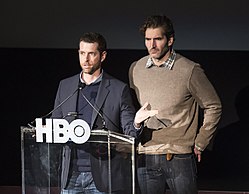Critical response
The episode received generally positive reviews; on review aggregator site Rotten Tomatoes, the episode holds an approval rating of 74%, based on 112 reviews, with an average rating of 8.79/10. The site's critical consensus reads, "Winter is here and Arya Stark may officially be the baddest woman in the land, but despite delivering some epic and emotional moments 'The Long Night' leaves a few things to be desired (lighting, anyone?) heading into the final stretch". [14]
There was praise for the direction and cinematography, with James Hibberd for Entertainment Weekly describing it as "an action epic that manages to weave character-driven stories through clear and comprehensible battle...GoT continues to make every fight unique, compelling and grounded". [15] Arya's unexpected defeat of the Night King was also praised. Alison Herman wrote for The Ringer : "That Arya was the one to seal the deal is heartening, at least...it was the woman who learned to master death and, ultimately, reject it, wielding the very weapon that caused her family so much grief". [16] Myles McNutt wrote for The A.V. Club : "What was pitched by the fandom around the show as an episode rife for death pooling became an episode about a girl who has lost her entire adolescence training for this moment facing the realization that she was not as prepared as she thought, before gaining the confidence—foreknowledge?—to strike the winning blow", allowing "the final moment to land despite an unavoidable feeling of anti-climax". [17]
Many criticized the handling of the White Walker mythology, what was viewed as the lack of catharsis, and the use of dark production lighting which was seen as gratuitous, artistically unnecessary and disorienting. [18] [19] [20] Caroline Fromke of Variety wrote: "After years of underlining just how huge and terrifying and all-consuming the threat of White Walker destruction would be, plunging back into 'who gets to sit on that pointy chair' will feel very silly." [21] Zach Kram of The Ringer called it "a strangely unsatisfying conclusion to a story line that has sustained the show from the very beginning... it seems like those most central questions will remain forever unanswered." [22] Some critics also said that the episode seemingly concluded the Azor Ahai prophecy arc without resolving it, as they expected Azor Ahai to kill the Night King, yet Arya Stark does not meet the prophecy's other requirements. [23] [24] [25]
The conclusion of the White Walker storyline and its significance to the ending of the show caused debate among commentators. Erik Kain of Forbes argued that it was a perfect ending to what was ultimately a secondary storyline to Game of Thrones, writing, "The Night King (who isn't really in the books) is pretty one-dimensional and uninteresting. More to the point, he isn't really what these stories have ever been about ... Cersei is far, far more interesting and compelling, because she's a real person with real motivations and fears and love and hate and everything in-between." [26] On the contrary, Alyssa Rosenberg of The Washington Post called the ending an "intellectual letdown, where a big episode of Game of Thrones felt like badly shot and edited fan service rather than a genuine revelation." [27]
Beric Dondarrion's saving of Arya and subsequent death scene were generally well received. Jolie Lash of Collider called it "an emotional and courageous ending", and said by opening his eye after death instead of closing it, the "character remained intriguing". [28] In interviews with actor Richard Dormer, Josh Wigler of The Hollywood Reporter and Leigh Blickley of The Huffington Post noted the barricade of the hallway was reminiscent of Hodor's iconic death in season 6, both selflessly suffering to defend the greater good; Dormer agreed and added it was also "almost Christ-like". [29] [30] Jack Shepherd of The Independent felt the death was "grisly, but purposeful" and gave the performance a 4/5 rating. [31]
Ryan Grauer, an associate professor of international affairs told Vox that "the tension between good military tactics and good television came into conflict" in this episode. Mick Cook, an Afghanistan war veteran, agreed that the army of the living incorrectly placed its infantry, catapults and trench, and ineffectively used its wall defenses and light cavalry (Dothraki). [32]
Tim Goodman of The Hollywood Reporter called the polarized reaction a demonstration of the impossibility of pleasing an entire audience of a television show with the scope of Game of Thrones, comparing it to the reception of the final seasons of Breaking Bad , Mad Men , The Sopranos , and The Wire . He wrote, "Fans (of television) are a combination of knowing exactly what they want from you and the story, not knowing what they want but willing to turn on you instantly if they don't get it, and some weird combination of happy but disappointed or let down, but also unwilling to trade the experience for anything [...] A consolation is that memory (and opinion) fades, and you're going into the magical, mythical Hall of Fame no matter what." [33]

